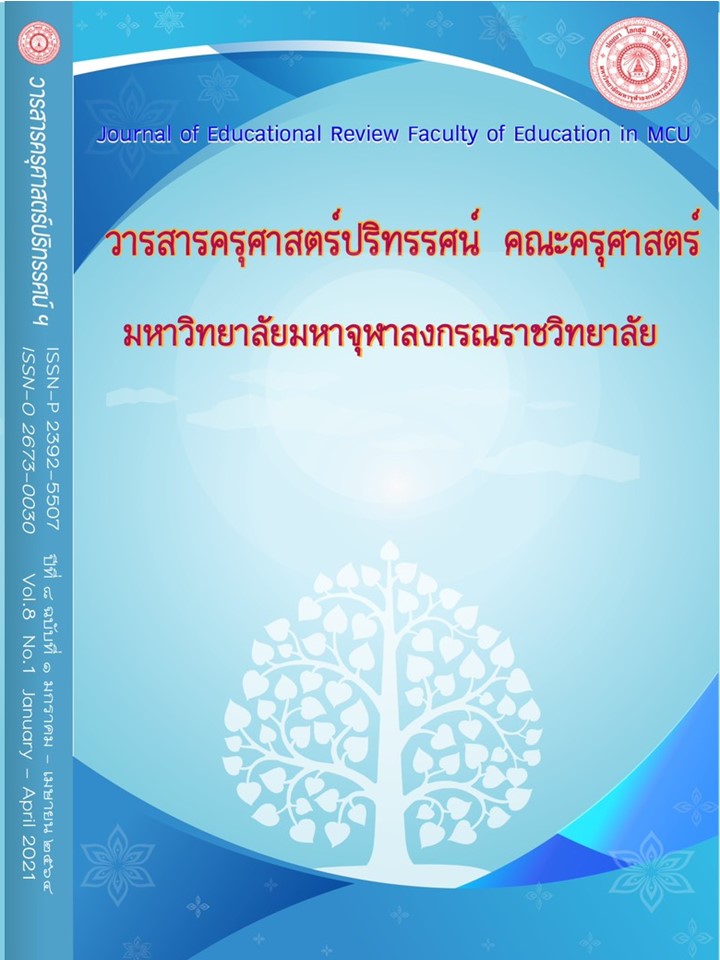A MODEL OF CRITICAL THINKING SKILLS DEVELOPMENT THROUGH BLENDED LEARNING BASED ON BUDDHIST EDUCATIONAL ADMINISTRATION FOR STUDENTS OF INSTITUTE OF VOCATIONAL EDUCATION CENTRAL REGION UNDER OFFICE OF THE VOCATIONAL EDUCATION COMMISSION
Main Article Content
Abstract
The purpose of this research was to propose a model for the development of critical thinking skills through blended learning according to the Buddhist principles of educational administration of Vocational Education students in the central region. Under the Office of the Vocational Education Commission It is a research method. There are 3 research steps which are: Step 1: Study the condition of critical thinking skills through blended learning according to the Buddhist principles of educational administration. The questionnaire was used by 394 students and students to analyze the data by statistical data: frequency, percentage, mean, standard deviation, step 2, the model was developed by interviewing 10 key informants/person and step 3, the model was also proposed. Discussion group with 10 photos/person. A Model for the Development of Critical Thinking Skills with Blended Learning According to the Buddhist Principles of Educational Administration of Vocational Education Students in the Central Region The Vocational Education Commission consists of 4 parts: part 1, lead part 1) environment, internal and external environment, 2) principles, 12 critical thinking skills, 3) objectives, benefits of blended learning. Part 2: Model 1) The system of critical thinking processes, namely (1) setting goals for thinking (2) identifying problems in thinking (3) processing both true and false information, relevant opinions in all dimensions. (4) Analyze, categorize and select the data to be used (5) Evaluate the data to be used in terms of accuracy and reliability (6) Rationality in determining the consequences and values (7) Weigh results and penalties (8) Contemplate and review carefully (9) Evaluate options and draw conclusions on the issues to be considered 2) Management processes The process of developing critical thinking is to create a consensus. Data interpretation Application of Principles Part 3, Application Procedures 1) Structure 2) Decision Making 3) Evaluation Guidelines and Part 4. Success conditions are the context of the vocational institution.
Article Details
ทัศนะและความคิดเห็นที่ปรากฏในบทความในวารสารฉบับนี้ถือเป็นความรับผิดชอบของผู้เขียนบทความนั้นเพียงผู้เดียว และไม่ถือเป็นทัศนะและความรับผิดชอบของกองบรรณาธิการ
กองบรรณาธิการขอสงวนสิทธิ์ในการคัดเลือกบทความลงตีพิมพ์และจะแจ้งให้เจ้าของบทความทราบหลังจากผู้ประเมินบทความตรวจอ่านบทความแล้ว
ต้นฉบับที่ได้รับการตีพิมพ์ในวารสารครุศาสตร์ปริทรรศน์ คณะครุศาสตร์ มหาวิทยาลัยมหาจุฬาลงกรณราชวิทยาลัย ถือเป็นกรรมสิทธิ์ของคณะครุศาสตร์ มหาวิทยาลัยมหาจุฬาลงกรณราชวิทยาลัย ห้ามนำข้อความทั้งหมดหรือบางส่วนไปพิมพ์ซ้ำ เว้นเสียแต่ว่าจะได้รับอนุญาตจากมหาวิทยาลัยฯ เป็นลายลักษณ์อักษร
References
กระทรวงศึกษาธิการ. (2559). แผนพัฒนาการศึกษาของกระทรวงศึกษาธิการ ฉบับที่ 12 (พ.ศ. 2560 – 2579). แหล่งที่มา http://www.bpp.mua.go.th/main/download/plan/EducationPlan12.pdf สืบค้นเมื่อ 15 ม.ค. 2563.
ทิศนา แขมณี. (2551). ศาสตร์การสอน องค์ความรู้เพื่อการจัดกระบวนการเรียนรู้ที่มีประสิทธิ์ภาพ. กรุงเทพมหานคร: ด่านสุทธาการพิมพ์.
นุชนาถ ชูกลิ่น. (2552). ผลของการใช้กิจกรรมการอภิปรายแบบผสมผสานและกระดานสนทนาในการเรียนรู้ด้วยกรณีศึกษาที่มีต่อการคิดอย่างมีวิจารณญาณของนักเรียนมัธยมศึกษาปี ที่ 5. วิทยานิพนธ์ครุศาสตรมหาบัณฑิต. จุฬาลงกรณ์มหาวิทยาลัย.
พระครูโสภณภัทรเวทย์ (อิทธิพล ปธานิโก), สมศักดิ์ บุญปู่ และสุทธิพงษ์ ศรีวิชัย. (2563). รูปแบบการพัฒนากิจกรรมการส่งเสริมคุณธรรมของนักเรียนสำหรับโรงเรียนสังกัดสำนักงานเขตพื้นที่การศึกษาประถมศึกษา. วารสารครุศาสตร์ปริทรรศน์ คณะครุศาสตร์ มหาวิทยาลัยมหาจุฬาลงกรณราชวิทยาลัย. 7(2). 231-241.
พระมหาประยูร ติกฺขปญฺโญ (ช่างการ). (2558). รูปแบบการพัฒนาบุคลากรเพื่อเสริมสร้างองค์การแห่งการเรียนรู้ในวิทยาลัยอาชีวศึกษาตามหลักพุทธบริหารการศึกษา. ดุษฎีนิพนธ์พุทธศาสตรดุษฎีบัณฑิต. มหาวิทยาลัยมหาจุฬาลงกรณราชวิทยาลัย.
สูติเทพ ศิริพิพัฒนกุล. (2553). การพัฒนาความสามารถในการแก้ปัญหาและการเรียนรู้เป็นทีมของนิสิตปริญญาบัณฑิตด้วยรูปแบบการเรียนแบบผสมผสานที่ใช้เทคนิคการเรียนร่วมกันด้วย กรณีศึกษาและเทคโนโลยีการแลกเปลี่ยนเรียนรู้ที่ต่างกัน. ดุษฎีนิพนธ์ครุศาสตรดุษฎีบัณฑิต. จุฬาลงกรณ์มหาวิทยาลัย.
hrnote.asia. (2562). การศึกษา (Education) สำคัญอย่างไรกับการพัฒนาทรัพยากรมนุษย์. แหล่งที่มา https://th.hrnote.asia/orgdevelopment/190625-education-for-hrd/ สืบค้นเมื่อ 15 ม.ค. 2563
Waheduzzaman, Wahed. (2010). People’s Participation for Good Governance: A Study of Rural Development Programs in Bangladesh. Docteral Thesis. Victoria University, Australia.


